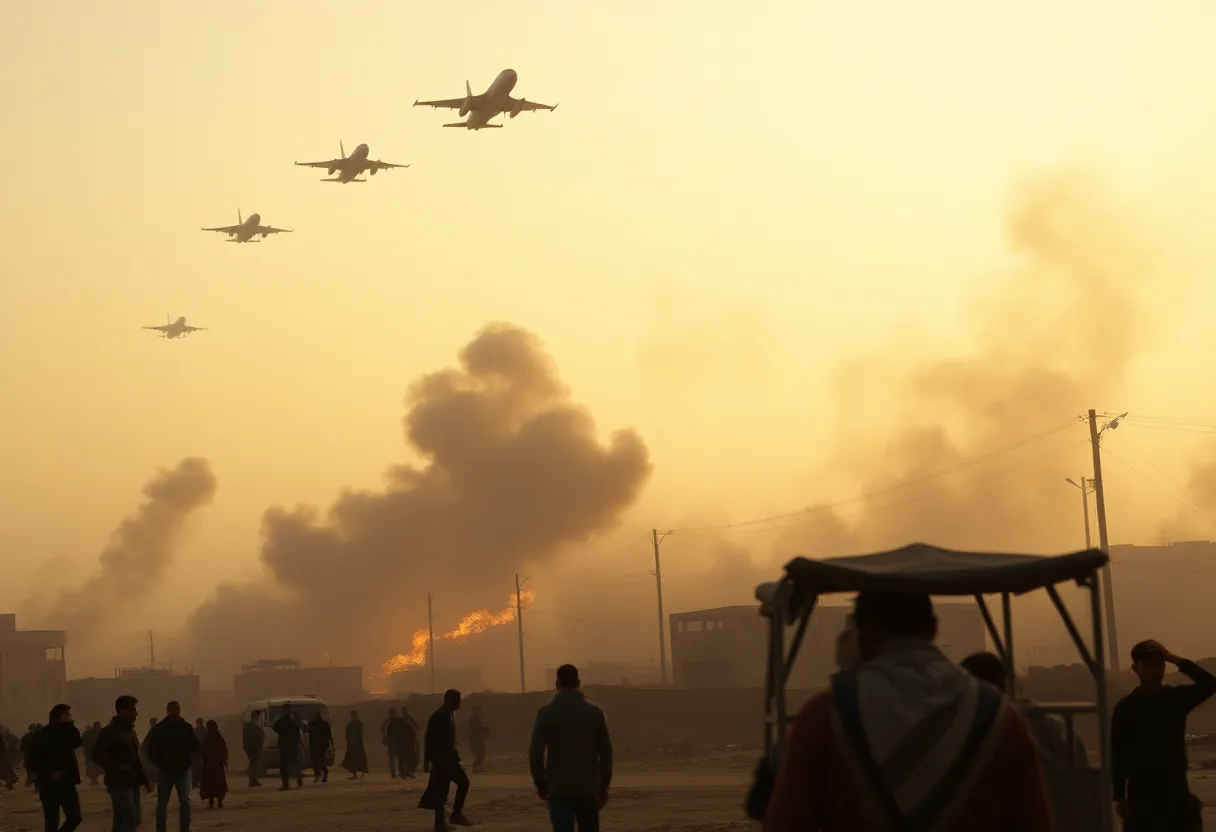News Summary
Israel has initiated preemptive strikes against Iran, targeting its nuclear and missile infrastructures amid rising fears over Iran’s potential development of nuclear weapons. This military action, termed ‘Operation Rising Lion,’ highlights the precarious state of geopolitics in the region, with both countries engaging in a cycle of retaliation. Civilians on both sides are impacting the conflict as governments impose communication restrictions. The economic repercussions are evident, with global oil prices surging and military assets being repositioned in the Middle East as tensions escalate.
Escalating Tensions: Israel Takes Flight Against Iran’s Nuclear Aspirations
In what seems to be a rapidly intensifying situation, Israel has launched preemptive strikes on Iran amidst heightened worries over Iran’s potential nuclear capabilities. This bold move comes on the heels of increasing intelligence reports suggesting that Iran may be dangerously close to producing nuclear weapons. It’s a heated atmosphere, with both sides exchanging sharp words and aggressive actions.
A Look at the Background
Former diplomats have been vocal about the potential fallout of these military actions. Notably, one former ambassador emphasized the gravity of Israel possibly moving forward without the support of its longtime ally, the United States. In this fragile geopolitical climate, discussions on Iran’s nuclear ambitions are having real-world consequences.
Recently, the current U.S. administration has shown a unified standpoint on the matter, particularly with President Trump and a notable figure in the intelligence community expressing strong concerns regarding Iran. While one individual previously indicated that Iran wasn’t actively pursuing nuclear weapons, recent comments from Trump paint a different picture, labeling Tehran as “very close” to achieving that alarming capability.
The Military Operations Unfold
Israel’s latest actions, termed Operation Rising Lion, explicitly targeted critical nuclear and missile infrastructures in Iran. Reports suggest that these strikes not only aimed at facilities but also went after several senior leaders within the Iranian military hierarchy. The Israeli Prime Minister has underscored that such military preemptiveness was vital, with claims that the very survival of Israel hangs in the balance due to the Iranian threat.
As tensions rose, authorities in Israel and Iran found themselves caught in a blistering cycle of retaliation. Iranian leaders have warned that they won’t stand idly by, promising retaliatory actions against Israeli strikes. As both countries exchanged missiles, alarms rang throughout Israel, prompting citizens to seek shelter amidst the chaos.
The Civilian Impact
The ensuing conflict has taken a toll on both nations, with reports of casualties piling up. The human cost is staggering, and civilians on both sides are bearing the brunt of military confrontations. Authorities worried about the safety of civilians on both fronts have prompted such warnings as evacuations in areas close to conflict zones.
The Iranian government, hoping to manage domestic perceptions of the conflict, has enacted internet and communication blackouts. This puts a lens on the serious implications of governmental control in times of crisis, limiting the flow of information regarding casualty numbers and military movements.
Economic Ramifications and Global Reactions
The economic landscape isn’t immune to the unravelling conflict either, as global oil prices have surged amid fears of a more extensive war in the Middle East. The Strait of Hormuz, a crucial shipping lane for oil, has become a focal point of concerns as the two nations continue their back-and-forth actions.
On the military front, the United States has moved military assets closer to the Middle East, signaling preparation for potentially more aggressive stances against Iran’s nuclear development. With escalating military actions, the theme of unconditional surrender has emerged, further complicating an already tense scenario between these nations.
The Path Forward
So where do things go from here? As legal disputes continue over territorial rights and the broader ramifications of Iran’s nuclear aspirations, the future remains uncertain. As both nations remain on high alert, the reality is that the stakes are not just military but fundamentally humanitarian and economic as well. It’s a waiting game, but the situation continues to evolve rapidly.
In this game of international chess, it’s crucial to keep an eye on the pieces in motion, as the outcomes could reshape the landscape for years to come.
Deeper Dive: News & Info About This Topic
- The Wall Street Journal
- Wikipedia: Iran–Israel Relations
- The New York Times
- Google Search: Israel Iran nuclear
- Al Jazeera
- Encyclopedia Britannica: Nuclear Safety
- CNN
- Google News: Israel Iran conflict

Author: STAFF HERE WILLIAMSBURG WRITER
The WILLIAMSBURG STAFF WRITER represents the experienced team at HEREWilliamsburg.com, your go-to source for actionable local news and information in Williamsburg, James City County, and beyond. Specializing in "news you can use," we cover essential topics like product reviews for personal and business needs, local business directories, politics, real estate trends, neighborhood insights, and state news affecting the area—with deep expertise drawn from years of dedicated reporting and strong community input, including local press releases and business updates. We deliver top reporting on high-value events such as Williamsburg Farmers Market, Yorktown Market Days, and Busch Gardens Food & Wine Festival. Our coverage extends to key organizations like the Greater Williamsburg Chamber of Commerce and Colonial Williamsburg Foundation, plus leading businesses in education and hospitality that power the local economy such as College of William & Mary, The Williamsburg Winery, and Sodexo. As part of the broader HERE network, including HEREVirginiaBeach.com, we provide comprehensive, credible insights into Virginia's dynamic landscape.


